

Here’s the latest news from the world of Omniglot.
There are new language pages about:
Hakha (Laiholh), a Kuki-Chin language spoken mainly in Chin State in western Myanmar.
Falam (Lai ṭong), a Kuki-Chin language spoken mainly in Chin State in western Myanmar, and also in Mizoram State in the northeast of India.
Zotung (Zo), a Kuki-Chin language spoken mainly in Chin State in western Myanmar.
New adapted script: Eestilitsa, a way to write Estonian (eesti keel) with the Cyrillic alphabet created by Wojciech Grala.
Кұикь инемисе’ сүннүсе’ авво ја ъигуиси пӧлъст үтесугумаидсис. Нәиле ом аннът мудсу ја сүәметуннистус ја нә пиәт үтсьтъ̈съга’ веле мӱду ләби кәүмә.
New adapted script: Võrolitsa, a way to write Võro (võro kiilʼ) with the Cyrillic alphabet created by Wojciech Grala.
Кұикь инемисе’ сүннүсе’ авво ја ъигуиси пӧлъст үтесугумаидсис. Нәиле ом аннът мудсу ја сүәметуннистус ја нә пиәт үтсьтъ̈съга’ веле мӱду ләби кәүмә.
New numbers pages:
Hakha (Laiholh), a Kuki-Chin language spoken mainly in Chin State in western Myanmar.
Chang (Changyanguh), a Brahmaputran language spoken in Nagaland in the northeast of India.
Salish (Séliš), a Salishian language spoken in parts of Montana and Washington State in the USA.
Chavchuven, a dialect of Koryak spoken in the west and north of the Kamchatka peninsula in the Russian Far East region.
New Tower of Babel translations: Hakha, Falam, Khumi, Ngawn and Zotung, which are all Kuki-Chin languages spoken mainly in Chin State in western Myanmar.
New articles: Unlocking the Mind and World: The Bountiful Benefits of Bilingualism and The Cardiganshire “Goidelic” numerals and Cantre’r Gwaelod, are they connected?
There’s a new Omniglot blog post entitled Saturn’s Bathing Day about words for Saturday in English and other languages, and there’s the usual Language Quiz. See if you can guess what language this is:
Here’s a clue: this language is spoken in the northwest of Russia.
The mystery language in last week’s language quiz was Gilaki (گیلکی), an Iranian language spoken in northwestern Iran.
Top comments